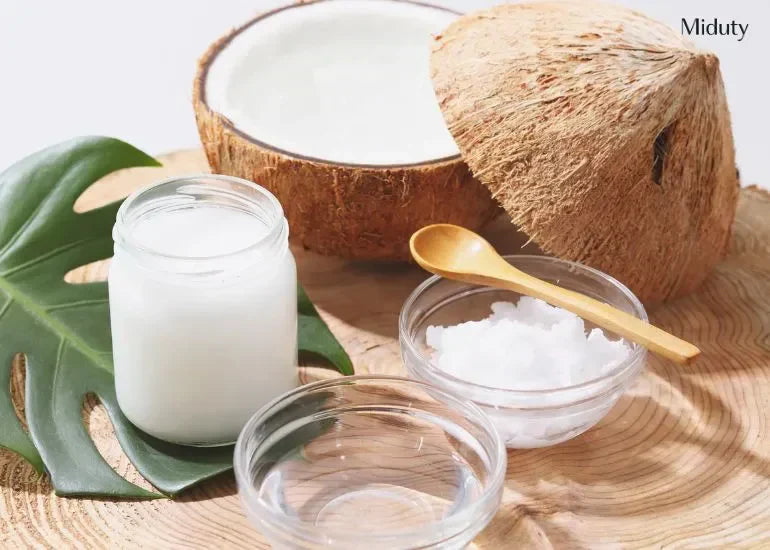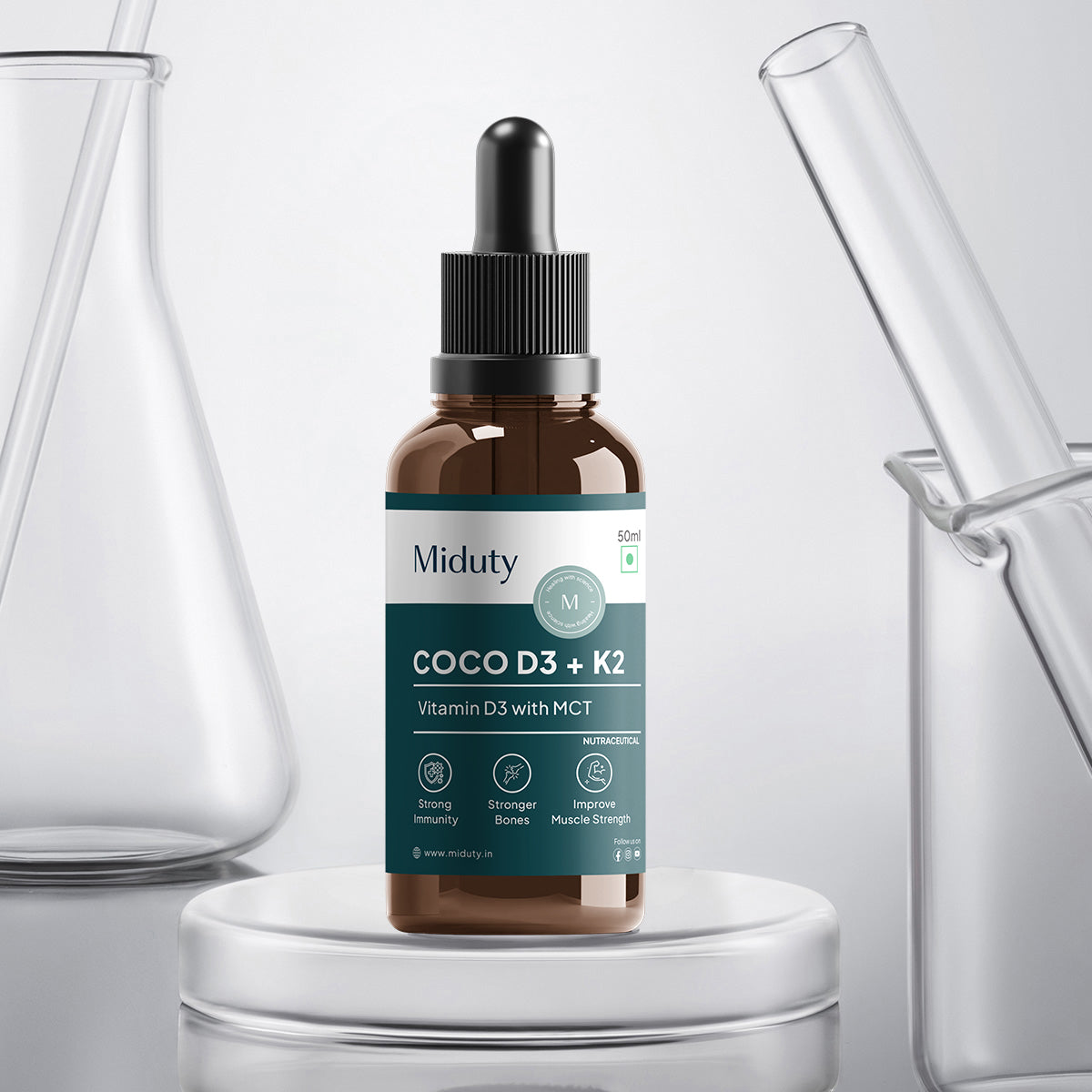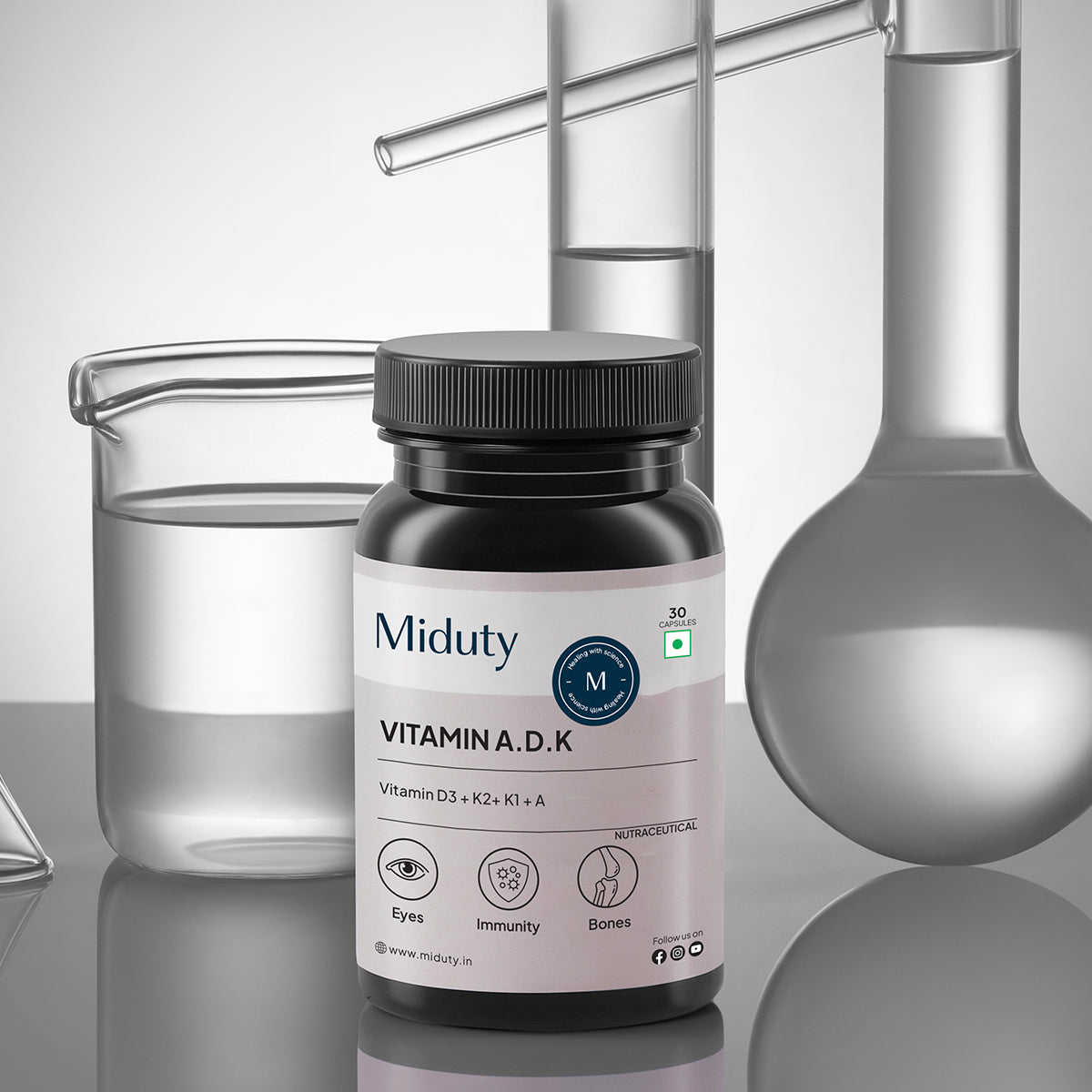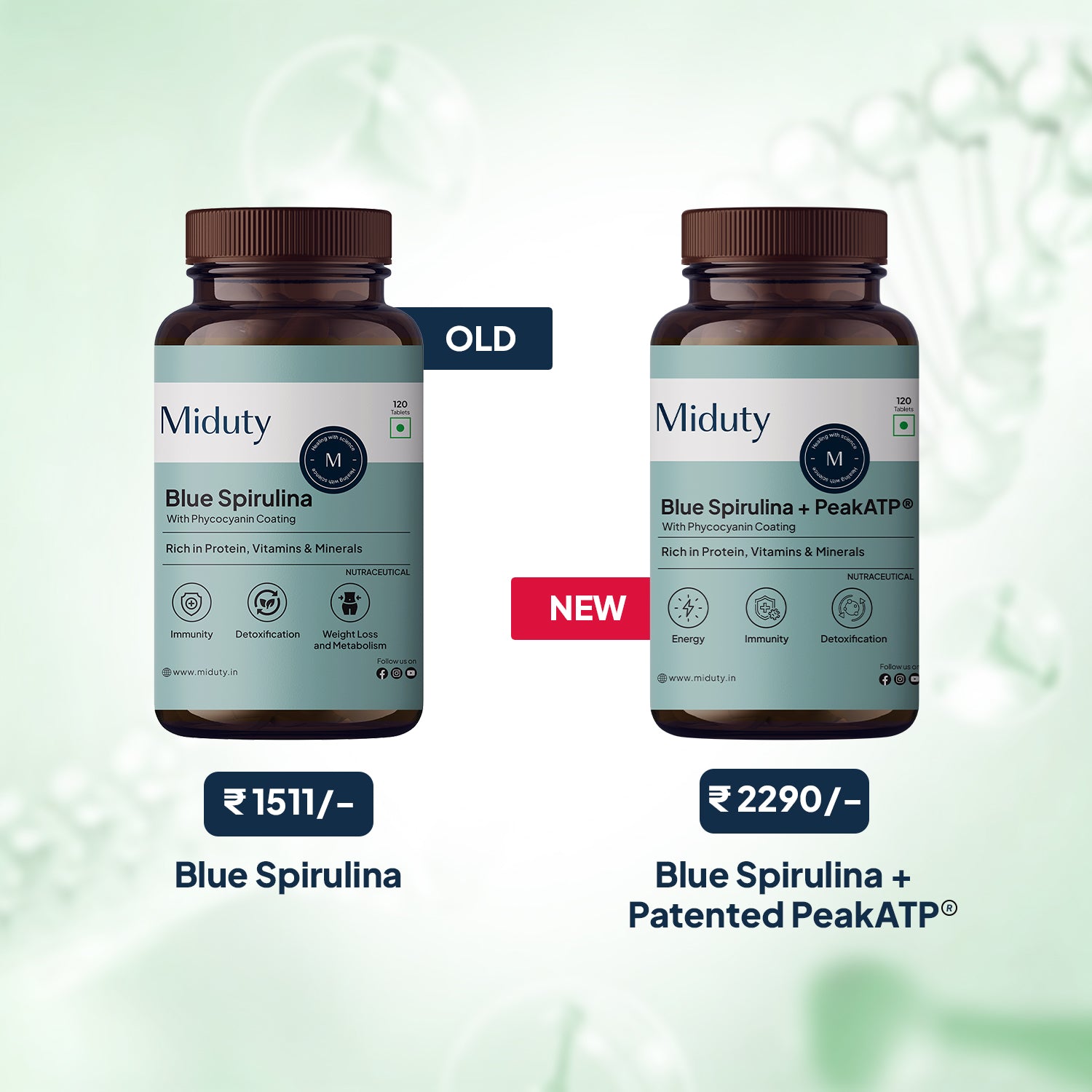
10 Benefits of Cold Pressed Coconut Oil Backed by Science
If you grew up in a household where coconut oil was a cure for almost everything—hair fall, dry skin, or even stomach troubles—you're not alone. For generations across Asia, Africa, and the Pacific Islands, coconut oil has been more than just a cooking medium; it has been a trusted remedy and a wellness staple.
But in today's health-conscious world, not all coconut oils are created equal. Walk into any supermarket, and you'll see refined coconut oil, virgin coconut oil, fractionated coconut oil, and cold pressed coconut oil. Among these, cold pressed coconut oil has been getting the most attention, and for good reason—it's minimally processed, nutrient-rich, and packed with health benefits.
Before we dive into what makes it so special, let's clear up the confusion around the different types of coconut oils available.
Key Takeaways
1. Cold pressed coconut oil isn't just cooking oil—it's a nutrient-packed superfood that supports your heart, brain, skin, and more.
2. Its unique medium-chain triglycerides (MCTs) are digested faster, giving you clean energy while supporting weight and metabolism.
3. From boosting immunity to fighting inflammation, science backs its role as a natural health protector.
4. It doubles as a beauty staple—hydrating skin, strengthening hair, and even improving oral hygiene through oil pulling.
5. A spoonful a day is enough—choose 100% pure, cold pressed, unrefined coconut oil for the best results inside and out.
Types of Coconut Oils
Not all coconut oils are made the same way. The method of extraction greatly affects their quality, nutrient profile, and even their potential health benefits. Here are the most common types you'll find:
1. Refined Coconut Oil: Made from dried coconut meat (copra), often processed with heat and chemicals to remove impurities. While stable for high-heat cooking, it loses many natural nutrients during refining.
2. Virgin Coconut Oil: Extracted from fresh coconut meat using either fermentation or expeller pressing. It retains more antioxidants and nutrients compared to refined oil.
3. Fractionated Coconut Oil: A processed version where long-chain fatty acids are removed, leaving only medium-chain triglycerides (MCTs). Popular in cosmetics and as a carrier oil, but not nutritionally complete.
4. Cold Pressed Coconut Oil: Extracted from fresh coconut meat using mechanical pressure at low temperatures, without heat or chemicals. This method preserves the oil's natural antioxidants, vitamins, and bioactive compounds, making it the purest and most beneficial form.
What is Cold Pressed Coconut Oil?
Cold pressed coconut oil is made by pressing fresh, white coconut flesh at temperatures below 60°C (140°F). Unlike refined oil, it is not bleached, deodorized, or chemically altered. This process ensures the oil retains:
- A light, nutty aroma and flavor.
- Natural antioxidants such as polyphenols.
- Medium-chain fatty acids like lauric acid, caprylic acid, and capric acid.
- Fat-soluble vitamins (E and K).
Think of it as the difference between freshly squeezed juice and a bottled juice from the supermarket—the freshness and nutrients in cold pressed oil are simply unmatched.
With this foundation set, let's explore the science-backed benefits that make cold pressed coconut oil a powerhouse for health and wellness.
10 Incredible Benefits of Cold Pressed Coconut Oil
1. A Heart-Friendly Choice
Cold pressed coconut oil is rich in medium-chain triglycerides (MCTs), which are metabolized quickly for energy instead of being stored as fat. This helps improve cholesterol balance by raising HDL ("good cholesterol") while maintaining healthy LDL levels. A clinical trial showed daily virgin coconut oil consumption significantly increased HDL cholesterol in women, supporting cardiovascular health. [1]
2. Strengthens Immunity
Lauric acid, the primary fatty acid in cold pressed coconut oil, converts to monolaurin in the body, which has strong antibacterial, antiviral, and antifungal properties. These compounds can help the body defend itself against infections by disrupting the membranes of harmful microbes. A review confirmed the antimicrobial effects of lauric acid and monolaurin against bacteria like Staphylococcus aureus and fungi such as Candida albicans. [2]
3. Supports Weight Management
Unlike long-chain fats, MCTs in coconut oil are rapidly metabolized, boosting calorie burning and fat oxidation. Research has shown that diets enriched with MCTs promote greater energy expenditure compared to long-chain fats, which may aid weight management. A controlled trial reported that participants consuming MCTs had lower body weight and waist circumference over time. [3]
4. Fuels Brain Health
Cold pressed coconut oil provides ketones, which serve as an efficient energy source for the brain when glucose supply is limited. This is especially relevant for aging individuals, where glucose uptake may decline. A study demonstrated that MCT supplementation improved memory performance in older adults with mild cognitive impairment. These findings suggest that adding cold pressed coconut oil to the diet may help support long-term cognitive health and brain function.
5. A Natural Moisturizer for Skin
Cold pressed coconut oil is rich in antioxidants and fatty acids that help hydrate and repair the skin barrier. It has been shown to be more effective than mineral oil in reducing dryness and improving skin conditions like eczema. A clinical trial confirmed its superior moisturizing effects in patients with atopic dermatitis. Its natural anti-inflammatory properties also make it a gentle option for soothing irritated or sensitive skin. [4]
6. Restores Hair Strength and Shine
Coconut oil penetrates the hair shaft more effectively than other oils, reducing protein loss and protecting hair from damage. Regular application helps improve hair texture, reduce dandruff, and strengthen strands. A comparative study found coconut oil outperformed sunflower and mineral oils in reducing protein loss in both healthy and damaged hair
7. Improves Oral Hygiene with Oil Pulling
Oil pulling with coconut oil is an Ayurvedic practice that supports oral health by reducing harmful bacteria in the mouth. Its lauric acid content provides antimicrobial benefits that help lower plaque and improve gum health. A clinical study confirmed that coconut oil pulling significantly reduced Streptococcus mutans counts, a key contributor to tooth decay. Over time, this simple habit can contribute to fresher breath and stronger overall oral hygiene. [5]
8. Fights Inflammation
Chronic inflammation contributes to many health issues, and cold pressed coconut oil provides antioxidants like polyphenols that help counter it. Animal studies show that coconut oil reduces oxidative stress and inflammatory markers, particularly in arthritis models. One study found virgin coconut oil significantly lowered joint inflammation in rats. These results suggest that incorporating it into the diet may support better joint health and overall inflammation management.
9. Aids Digestion and Gut Health
MCTs in cold pressed coconut oil are easier to digest since they don't require bile salts, making them beneficial for people with digestive issues. Its antimicrobial properties also support a balanced gut microbiome by reducing harmful bacteria. Research highlighted coconut oil's positive effect on digestion and gut microbial health. This makes it a gentle yet effective addition to support overall gastrointestinal wellness.
10. A Quick and Clean Energy Source
Because MCTs are rapidly metabolized into ketones, they provide a quick and sustainable source of energy for both the brain and muscles. Athletes in particular benefit from MCTs as they help improve endurance and reduce fatigue. A landmark study confirmed that MCT supplementation enhanced exercise performance and endurance capacity.
How to Choose the Right Cold-Pressed Coconut Oil?
With so many brands in the Indian market, it can be confusing to pick the best cold-pressed coconut oil. Here are a few tips to make the right choice:
1. Look for Organic Certification: Choose oils that are certified organic by reputed bodies like India Organic, FSSAI, or USDA Organic. This ensures the coconuts were grown without harmful chemicals or pesticides.
2. Check for Non-GMO Labels: Non-GMO oils are made from coconuts that haven't been genetically modified. This means you're getting a safer and more natural product, free from chemical alterations.
3. Don't Get Misled by "Extra Virgin": In India, many brands use the term "extra virgin" to attract buyers, but there's no such grade for coconut oil. Whether labeled virgin or extra virgin, it means cold-pressed and unrefined.
While you can always apply cold-pressed coconut oil directly to your skin or hair, or even use it in cooking, there's an easier and more effective option—a supplement that combines MCT oil with Vitamin D3 and K2 drops. This not only delivers the goodness of coconut oil but also supports stronger bones, better immunity, and overall health in a convenient, tasty form.
Final Thoughts
Cold pressed coconut oil is more than just another pantry item—it's a versatile health ally that supports the heart, brain, skin, digestion, and beyond. Unlike refined oils, it preserves natural compounds that make a real difference to your health and wellness.
Still, balance is key. Coconut oil is calorie-dense, so stick to 1–2 tablespoons per day. And when buying, look for labels like "100% pure," "cold pressed," and "unrefined" to ensure you're getting the highest quality.
So whether you're cooking a meal, moisturizing your skin, or giving your hair some love, cold pressed coconut oil is one natural choice you can feel confident about.
FAQ's on Cold Pressed Coconut Oil Benefits -
Q1 - What are the benefits of taking a teaspoon of coconut oil in the morning?
Taking a teaspoon of cold-pressed coconut oil in the morning can be a simple yet powerful habit. Thanks to its medium-chain triglycerides (MCTs) and lauric acid, it may boost energy levels, enhance metabolism, and support healthy digestion and immunity. Regular intake can also aid in weight management by promoting a feeling of fullness and may even sharpen brain function by supplying ketones as an alternative fuel for the mind.
Q2 - Can you use coconut oil when pregnant?
Yes, coconut oil can be safely used during pregnancy in more than one way. Applied topically, it helps moisturize the skin, soothe dryness, and may even reduce the appearance of stretch marks. When consumed in moderation as part of a balanced diet, it also serves as a natural source of healthy fats and energy.
Q3 - Is cold-pressed coconut oil better?
Yes, cold-pressed coconut oil is generally considered better because it's extracted without high heat or chemicals, helping preserve its nutrients, antioxidants, and natural flavor. The result is a purer oil with greater health benefits, a pleasant aroma, and versatile uses—from cooking to skincare and haircare.
Q4 - Is cold pressed coconut oil good for heart patients?
Cold-pressed coconut oil is not the best option for heart patients because it is high in saturated fat, which may raise LDL ("bad") cholesterol—a key risk factor for heart disease. While it does retain antioxidants and nutrients due to minimal processing, moderation is essential. For heart health, liquid plant oils such as olive oil, canola oil, or sunflower oil, which are rich in monounsaturated and polyunsaturated fats, are generally recommended over coconut oil.
Q5 - How long is cold pressed coconut oil good for?
The shelf life of cold-pressed coconut oil typically ranges from 6 months to 1 year if stored properly in a cool, dark place. However, this can vary depending on the brand, packaging, and storage conditions. Over time, the oil may lose its fresh aroma and nutritional value, and signs of spoilage include a rancid, bitter, or unpleasant smell and taste.
References












